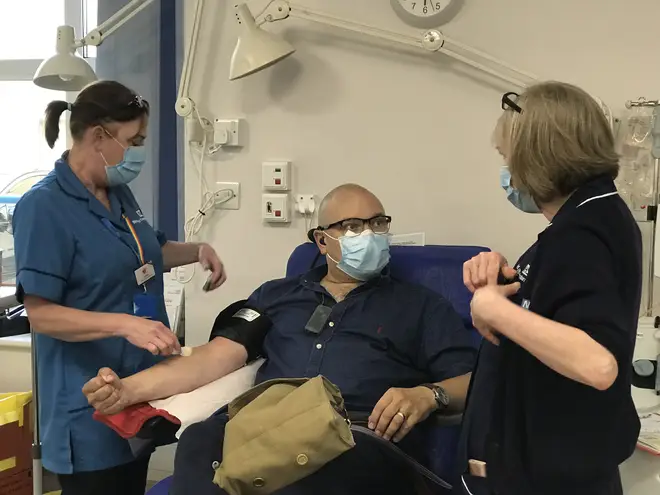
Clive Bull 1am - 4am
30 July 2020, 09:53

A paramedic who brushed with death while fighting coronavirus is donating his blood plasma to help other patients.
Richard Webb-Stevens, from Wealdstone, who works for London Ambulance Service, was critically ill in hospital with the virus in March.
The 46-year-old was taken to Northwick Park hospital by ambulance colleagues on blue lights and was in a Covid-19 ward for five days.
“I woke up one day feeling a little bit chestier than usual and it didn’t feel like asthma. The symptoms came on all of a sudden about four hours later," he said.
"It honestly felt like I had been hit by a bus."
He is still recovering but is now taking part in a national trial to see if his blood plasma could be transfused help treat people who are seriously ill with the virus after NHS Blood and Transplant (NHSBT) contacted him.
“I’m truly over the moon. Apparently I have enough antibodies to help others,” he said.

Coronavirus patient gives uplifting message
“I’ve felt so useless not being on the frontline for the first time years – but now at least I can still play my part in helping fight against this awful virus.”
NHSBT is prioritising people with positive tests and men as they are more likely to have high enough antibody levels for the donation to be eligible for use in the trial.
If successful, blood plasma could be used in hospitals to improve the chances of survival and speed of recovery for coronavirus patients.
Richard, who was born deaf, has spent over 20 years working for London Ambulance Service and is acting clinical team manager for the motorcycle response unit. He was previously the first deaf person to work as a flight paramedic on London's Air Ambulance.
READ MORE: Sickest coronavirus patients could be given lab-made antibodies
READ MORE: Young people could be driving coronavirus spike, WHO warns

Friend of 30 years years pays tribute to first NHS worker to die in Scotland from Coronavirus
When staying in the Covid-19 ward and unable to speak, Richard was still able to sign to his wife, Marie, via video on his mobile phone.
But as a lip-reader, he sometimes found it tough in the hospital where doctors and nurses would be wearing masks.
He said: “It was difficult being able to distinguish who was talking but the nurses and doctors there were so understanding and they would take things a little slower and try to minimise the noise when talking to me.
“It was about six weeks until I was able to start to get back into a normal routine and begin doing normal things again. I still find it hard walking up the stairs, something I wouldn’t even think about before I am finding difficult – the shortness of breath just hits you sometimes.
“I’ve still got a long road to recovery but I know I am one of the lucky ones.”
Anyone who has had coronavirus, either a test result or the symptoms, can offer to donate plasma at a donor centre by calling 0300 123 23 23 or visit the NHSBT website.